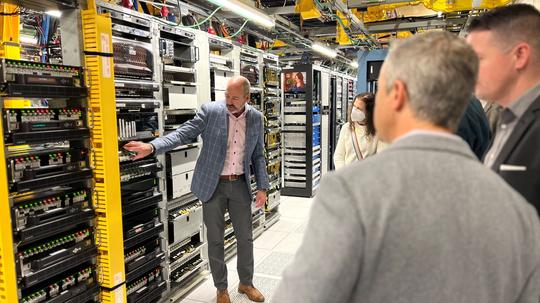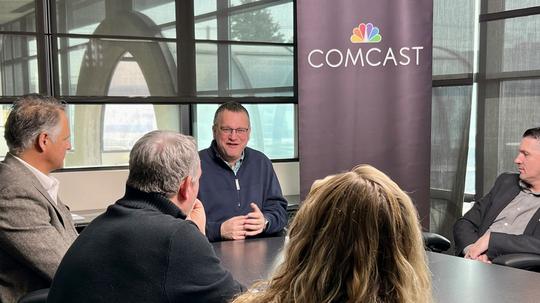
Inside a Denver home or office, it’s common for multiple devices to access the internet at the same time. In many households, you may find someone streaming a movie on a 4K television while another family member is gaming online with thousands of people around the world. In the office, just as the executive team logs into a video conference to host a remote board of directors’ meeting, members of the marketing team may enter the metaverse to brainstorm with peers from locations across the nation.
Using these applications without experiencing buffering, freezing or crashing is possible because of the evolution of high-speed Wi-Fi internet that offers: ultra-fast upload and download speeds, bandwidth robust enough to power hundreds of devices at once and advanced cybersecurity.
These advancements come at a time when the technology consumers demand requires more bandwidth and greater speeds to operate optimally; there’s a continuation of remote work placing more demands on home and corporate networks; and there’s a near universal reliance by businesses on applications in the cloud.
Deploying multi-gig internet speeds and 10G in Denver
To stay ahead of customer demand, Comcast is rolling out an additional multi-gig internet speed tier for Xfinity residential and Comcast Business customers throughout the Denver metro area. Denver is the most recent area in Colorado in which Comcast delivers download speeds of up to 2 gigabits-per-second and upload speeds that are up to five- to 10-times faster than existing networks.
This initiative is part of the largest- and fastest-ever multi-gig deployment in the United States, which Comcast launched in 2022. As an additional component of the project, the company plans to introduce 10G-enabled multi-gig symmetrical services in the second half of 2023.

“Comcast has been on a journey toward 10G that started five years ago as part of a transition to a virtualized cloud-based network,” said Elad Nafshi, Comcast’s chief network officer. “This is cutting-edge, web-scale technology that will allow us, going forward, to push the boundaries in delivering high-speed data services.”
Here are some highlights of Comcast’s multi-gig deployment.
Preparing Denver-area residents and businesses
Comcast has moved to a new virtualized cloud-based architecture as part of the transition to prepare for 10G and DOCSIS 4.0, a technology that dramatically increases the amount of data Comcast can deliver upstream and downstream to enable multi-gigabit symmetrical speeds over traditional cable connections pre-existing in homes and businesses.
“This upgrade will reach every one of our subscribers equally — not just select neighborhoods and customers — and without needing to dig up yards and sidewalks,” Nafshi said. “As these new internet speeds roll out, they’ll reach more than 50 million homes and businesses (nationally) before the end of 2025.”
In preparation for faster residential network speeds, Comcast has launched its latest Wi-Fi 6E Gateway, billed as one of the world’s first routers to support multi-gigabit symmetrical Wi-Fi. On the business side, Comcast offers a new, ultra-advanced multi-gigabit gateway.
Increased sustainability, greater reliability and more security
The new infrastructure gets away from the analog nodes of Comcast’s legacy platform and instead uses digital tech, which requires less space and delivers faster speeds.
The transition to the virtualized cloud-based network will improve energy efficiency by reducing the electricity per byte of data by 50%. “Comcast has brought a sustainability-first approach to this implementation, in addition to delivering fast and reliable internet service,” Nafshi said. “It’s part of our goal to be carbon neutral by 2035.”
Rather than having to maintain, update and replace traditional analog network appliances by hand, which can take days or even weeks, Comcast engineers can reliably maintain, troubleshoot and upgrade core network components almost instantly with a few keystrokes on a laptop or mobile app. “A truly integral part of virtualization is being able to leverage real-time visibility into the network, down to the second something happens,” Nafshi said. “That real-time visibility allows our technicians to resolve problems faster.”
The advanced Wi-Fi gateways also offer increased cybersecurity protection to safeguard all connected devices from malware and other threats. “Security is at the core of everything Comcast does,” Nafshi said. “The virtualization includes a robust security stream that will be supported across the network.”
Why Denver was chosen and the direct impact on residents and businesses
Comcast’s Western Division headquarters is in the Denver region and 6,700 of its employees work throughout Colorado. As a vibrant technology center, it made sense for the Mile High City to be one of the 34 markets that received the network upgrade in 2022, said David Krook, Comcast’s senior director of headend engineering in Denver.
Krook said Comcast has invested $1.2 billion in Colorado over the past three years to continue to deploy the fiber optic cable that makes the ultra-fast upload and download speeds possible. There are 1,200 miles of fiber in Denver and 9,000 miles across the state, which complement 17,000 miles of coaxial cable, according to Krook.
For Denver residences, the multi-gig speeds mean every game console, streaming TV, virtual reality headset, laptop and other connected devices will receive the bandwidth and speeds they need to operate optimally. It also brings access and reliability to online services that are growing in the telehealth and education spaces.
For businesses, the enhanced internet service comes with many advantages:
- Enables documents to be uploaded and downloaded quickly to reach decision makers faster.
- Allows mega files from photo shoots to be transmitted more efficiently.
- Brings reliability to data backup and recovery.
- Allows thousands of employees to tap into networks at the same time.
- Boosts the security of financial transactions.
- Increases productivity by reducing lag time.
- Fosters seamless collaboration in a virtual world.
“We’re not making this network investment for today,” Nafshi said. “It’s to make sure our network will never stop our customers from getting the best performance that exists as technology evolves. This multi-gig deployment will be truly transformative in terms of the customer experience.”
Learn more about how Comcast is rolling out the largest- and fastest- ever multi-gig deployment in Colorado.
Laura Newpoff is a freelance writer with The Business Journals Content Studio.
